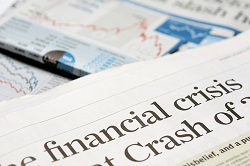 The Fed meeting today (Tuesday) will adjourn tomorrow with a predictably vague statement about how the U.S. Federal Reserve's Federal Open Market Committee is considering rate hikes on a meeting-by-meeting basis.
The Fed meeting today (Tuesday) will adjourn tomorrow with a predictably vague statement about how the U.S. Federal Reserve's Federal Open Market Committee is considering rate hikes on a meeting-by-meeting basis.
But what won't be discussed at the Fed meeting today or tomorrow is how it's that same FOMC that has been setting the stage for the next global financial crisis...
You see, the Fed may be taking its foot off the easy money pedal. But in the years that led up to this anticipated 2015 rate hike, they took the lead in recasting the role of the Fed - as a guarantor of destructive big bank practices. And it has led the world's central banks to follow suit.
Three rounds of quantitative easing were billed as a stimulative monetary policy measure that would bring more liquidity to the system, unclog credit markets, and get a slow-moving economy kicked into gear.
But it was really a feint in a much larger game of papering over the real problems underlying a fragile financial system.
"The one thing that central banks the world over don't want to have happen is a default. They don't want a run on the banks," Money Morning Chief Investment Strategist Keith Fitz-Gerald said. "So they are doing everything they can to maintain the illusion of prosperity. And that means prop banks up, save them... whatever."
It's hardly a secret at this point that QE is a giveaway to the banks. It gives those who loaded up on toxic assets an escape hatch, as the Fed takes those assets off their balance sheets and credits their reserve accounts.
This was done under the guise of stimulating lending. But as long as the rest of the economy is deleveraging and not taking out loans, this bolstering of reserves does little on this front. What it does instead is give the banks an opportunity to make free money by arbitraging Fed funds.
But what it's ultimately done is stave off an inevitable collapse. It's propped up financially shaky institutions without making them accountable for their past indiscretions.
All while allowing the same bad practices to continue unabated, and to, ultimately, pave the way for a collapse...
Here's just how bad this situation is...
What the Fed Meeting Today Really Says About the Global Financial System
"The issue is that the modern banking system is based on what they call hypothecated assets - a fractional reserve system," Fitz-Gerald said. "You only need to have one dollar on tap for every eight, nine dollars in the system. So you take that dollar and you keep part of it and you loan part of it. And the next bank keeps part of it and loans part of it - usually eight or nine times."
The problem will become apparent when the easy money game is up. All it takes is one bank failure to ripple through the whole financial system.
"Somebody's going to be looking for that actual dollar because they're going to want to perfect their collateral and that potentially starts what they call a 'cascading default' series," Fitz-Gerald said."So, this bank has its margin call, can't meet it, fails. That bank has debt with that bank which now gets the same margin call, which fails. This creditor has a run upstream until they find the dollar."
"Cascading default" is not a term that will make its way into the Fed meeting today.
[epom key="ddec3ef33420ef7c9964a4695c349764" redirect="" sourceid="" imported="false"]
In fact, the Fed meeting today will be painted as one of the last few meetings during the era of the zero interest rate policy. It will be as if the country's fiscal house has been righted, and the clean up from the last global financial crisis is nearing an end.
But in reality, the seeds of the next global financial crisis have already been sowed. And Europe and Japan are all too willing to keep the central bank game going through their own QE measures.
"These guys think they're masters of the universe and they don't realize they're really a bunch of peons," Fitz-Gerald said. "It's getting worse- by every metric imaginable. The banks are more concentrated, there's more derivatives, there's more risk, there's more leverage, and the concentration of risk is even more extreme than it was before 2007. The government wants you to believe that they've cleaned this mess up. Not even remotely close."
Elsewhere in the Global Economy... China is secretly stockpiling gold. The country has withheld official numbers reports six years and counting. Now there's a $4 trillion threat to the U.S. dollar - and the global economy at large...
Jim Bach is an Associate Editor at Money Morning. You can follow him on Twitter@JimBach22.


